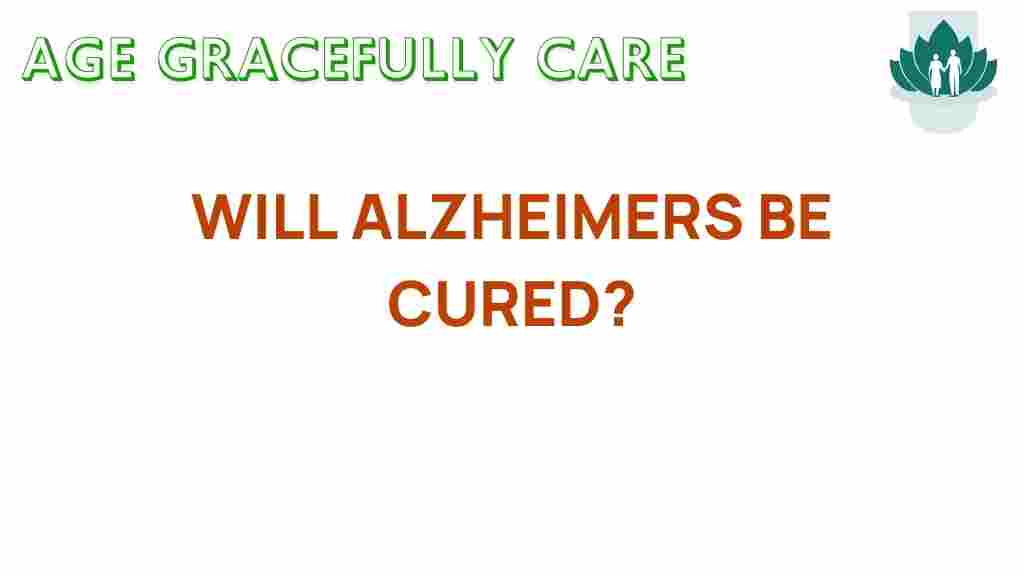Will Alzheimer’s Disease Finally Find Its Cure?
Alzheimer’s disease is a complex and devastating neurodegenerative disorder that affects millions of individuals worldwide. As we continue to advance in scientific research, the question on everyone’s mind is: will Alzheimer’s finally find its cure? This article delves into the current state of research, recent breakthroughs, and potential treatment options, aiming to shed light on the future of Alzheimer’s care and the importance of raising awareness about this condition.
The Burden of Alzheimer’s Disease
Alzheimer’s disease is the most common form of dementia, accounting for 60-80% of all dementia cases. It primarily affects older adults, leading to memory loss, cognitive decline, and changes in behavior. The Alzheimer’s Association reports that more than 6 million Americans are living with the disease, a number that is expected to rise dramatically as the population ages.
The impact of Alzheimer’s extends beyond the individuals diagnosed; it also affects families and caregivers who take on the burden of care, often leading to emotional and financial strain. Therefore, finding effective treatments and, ideally, a cure is of utmost importance.
Current State of Alzheimer’s Research
Research into Alzheimer’s disease has progressed significantly over the past few decades. Scientists are exploring various avenues to understand the mechanisms behind the disease and develop effective treatments. Here are some major areas of focus:
- Amyloid Plaques and Tau Tangles: One of the hallmarks of Alzheimer’s is the accumulation of amyloid plaques and tau tangles in the brain. Researchers are investigating therapies that target these proteins to prevent their formation or promote their clearance.
- Neuroinflammation: Inflammation in the brain is another characteristic of Alzheimer’s. Studies are looking into anti-inflammatory drugs that could potentially halt or slow the progression of the disease.
- Genetic Factors: Genetic research has identified several genes associated with Alzheimer’s. Understanding these genetic markers may pave the way for personalized treatment approaches.
- Lifestyle Factors: Research indicates that lifestyle choices such as diet, exercise, and social engagement may play a role in the risk and progression of Alzheimer’s.
Recent Breakthroughs in Alzheimer’s Treatment
While there is no definitive cure for Alzheimer’s yet, several recent breakthroughs have shown promise in treatment and management of the disease:
- Anti-Amyloid Drugs: Medications such as aducanumab have been developed to target amyloid plaques. Although these drugs have had mixed results in clinical trials, they represent a shift towards disease-modifying therapies.
- Combination Therapies: Researchers are exploring the effectiveness of using multiple drugs in conjunction to enhance cognitive function and slow disease progression.
- Digital Therapeutics: Technology is playing a crucial role in managing Alzheimer’s. Apps and online programs designed to stimulate cognitive function are being tested as adjunct therapies.
Step-by-Step Process of Alzheimer’s Research and Treatment Development
The journey from research to treatment involves several critical steps:
- Basic Research: Understanding the biology of Alzheimer’s through laboratory studies and animal models.
- Clinical Trials: Testing new drugs or therapies in humans through phased clinical trials to assess safety and efficacy.
- Regulatory Approval: Submitting findings to regulatory bodies such as the FDA for approval before a treatment can be widely used.
- Post-Marketing Surveillance: Monitoring the long-term effects and efficacy of the approved treatments in the general population.
Challenges in Alzheimer’s Research
Despite the progress, challenges remain in the quest for an Alzheimer’s cure:
- Complexity of the Disease: Alzheimer’s is multifactorial, making it difficult to pinpoint a single cause or effective treatment.
- Funding and Resources: Adequate funding is crucial for ongoing research, yet it often falls short of the need.
- Awareness and Advocacy: Raising awareness about Alzheimer’s and advocating for research funding is essential to support ongoing efforts in finding a cure.
Troubleshooting Tips for Caregivers
For those caring for individuals with Alzheimer’s, it’s crucial to have strategies in place to manage the challenges that arise:
- Educate Yourself: Understanding the disease can help in managing symptoms and improving communication.
- Establish Routines: Consistency can provide comfort and reduce confusion for those with Alzheimer’s.
- Utilize Support Networks: Connect with local or online support groups for caregivers to share experiences and gain insights.
- Prioritize Self-Care: Caregivers should take time for themselves to prevent burnout and maintain their well-being.
Raising Awareness About Alzheimer’s
Creating awareness about Alzheimer’s disease is vital for several reasons:
- Increased Funding: Greater awareness can lead to increased funding for research and support services.
- Community Support: Awareness initiatives can foster community support for affected individuals and their families.
- Education and Prevention: Educating the public about risk factors and prevention strategies can help reduce the incidence of Alzheimer’s.
To learn more about Alzheimer’s disease and how to get involved in awareness campaigns, visit the Alzheimer’s Association website.
The Future of Alzheimer’s Treatments
While we have not yet found a definitive cure for Alzheimer’s, the landscape of research is evolving, and scientists are hopeful. With the advent of new technologies, innovative treatment approaches, and increased collaboration among researchers, the potential for breakthroughs is greater than ever.
Additionally, the role of healthcare systems in managing Alzheimer’s cannot be understated. A comprehensive approach that includes early detection, proper diagnosis, and ongoing care is critical in managing the disease effectively.
Conclusion
In conclusion, the question of whether Alzheimer’s disease will finally find its cure is complex and multifaceted. While significant strides have been made in research and treatment, much work remains to be done. Increased awareness, funding, and advocacy are essential in this ongoing battle against a disease that has profound implications for individuals, families, and society as a whole. By supporting research initiatives and promoting education, we can all play a role in advancing the quest for a cure for Alzheimer’s.
As we look to the future, there is hope. With continued dedication to research and treatment development, the day may come when we can say that Alzheimer’s has finally found its cure.
This article is in the category Health and created by AgeGracefullyCare Team
